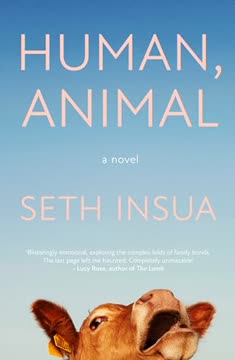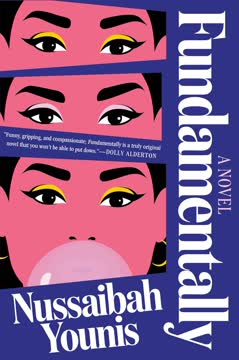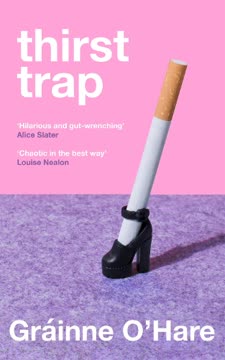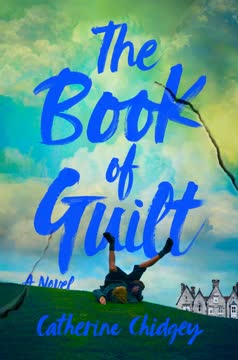Plot Summary
Night Cows and Old Ghosts
George Calvert, a weary dairy farmer, is jolted awake by his elderly mother's nocturnal wanderings, mistaking her for a cow loose in the orchard. The night is thick with memories—of his late brother Mike, of the farm's burdens, and of the generational weight pressing on his chest. As George shepherds his confused mother back inside, the cold and the ache in his body mirror the emotional distance in his family. The farm is a living legacy, but also a prison of expectation and regret. George's wife Sandra and their sons, Harry and Tom, orbit around him, each carrying their own secrets and resentments. The night's disruptions foreshadow the deeper unrest simmering within the family and the farm itself.
Protest in the Cowshed
At dawn, the Calvert family is confronted by animal rights activists who have broken into their cowshed, filming and accusing them of cruelty. The activists, led by the charismatic Luke Underwood, challenge the family's practices, capturing footage of a dead calf and the messy realities of winter farming. The confrontation exposes generational divides: Harry defends the family's honor, while Tom, recently vegan and estranged, is caught between loyalties. The activists' presence is both a literal and symbolic invasion, threatening the family's livelihood and sense of self. The incident leaves the Calverts shaken, their private world suddenly exposed to public scrutiny, and sets in motion a chain of events that will test every bond.
Family Fractures, Vegan Fights
Tom, the younger son, struggles with his identity and beliefs, feeling alienated from the farm's traditions and his father's expectations. His veganism is not just a dietary choice but a rebellion against the family's way of life. Arguments over food escalate into deeper conflicts about respect, belonging, and the right to change. Harry, the elder son, is the dutiful heir, but even he feels the strain of living up to George's standards. Sandra tries to mediate, but the family dinner table becomes a battleground. Tom's secret communications with Luke and the activists deepen his sense of isolation, as he seeks understanding and connection outside the family, setting the stage for betrayal.
The Weight of Inheritance
George is haunted by the legacy of the farm and the ghosts of his father and brother. The pressure to maintain Alderdown, both as a business and a symbol of family continuity, is crushing. Financial worries, aging infrastructure, and the relentless demands of the land erode his confidence. Memories of his own failures and the loss of his brother Mike—who died in a farm accident—linger like open wounds. The farm is both sanctuary and trap, its history a source of pride and pain. George's inability to adapt or communicate his vulnerability widens the gap with his sons, especially as Tom's differences become more pronounced.
Viral Outrage, Digital Storm
The activists' video goes viral, painting Alderdown as a site of cruelty and neglect. The Calverts are bombarded with hate mail, threats, and public shaming. The digital storm amplifies every flaw, turning private struggles into public spectacle. Sandra and Tom attempt damage control online, but the tide is relentless. The family is forced to confront the power of social media and the fragility of their reputation. The farm's future—and the wedding business Lauren is building—are jeopardized. The crisis exposes the limits of rural isolation in a connected world, and the family's unity begins to unravel under the weight of external judgment and internal blame.
Tam's Secret World
Tom, who increasingly identifies as Tam, navigates a hidden life of gender exploration and online connection. In the privacy of their room, Tam experiments with makeup, new pronouns, and anonymous chats, seeking a sense of self that the farm and family cannot provide. The relationship with Luke is both romantic and political, offering validation but also manipulation. Tam's struggle is not just with gender, but with the fear of rejection and the longing to be seen. The tension between authenticity and safety grows, as Tam weighs the cost of coming out against the pain of invisibility. The farm becomes a symbol of both roots and restraints.
Wartime Shadows, Hidden Roots
Interwoven with the present-day narrative are excerpts from the wartime journal of Stefan Becker, a German POW who worked at Alderdown in the 1940s. Stefan's outsider perspective reveals the farm's history of resilience, adaptation, and forbidden connections. His relationship with Maggie Edwards, the farmer's daughter, is marked by tenderness and tragedy, echoing Tam's own struggles with belonging and love. The legacy of war, secrecy, and survival shapes the Calvert family in ways they do not fully understand. The past is not dead; it lives on in the land, the family's silences, and the patterns of conflict and reconciliation.
Flood, Fire, and Foxes
A catastrophic flood threatens the herd, forcing Maggie and Stefan in the past—and the Calverts in the present—to confront the unpredictability of nature. The farm's vulnerability is laid bare, as animals are lost and the land scarred. In the present, a kitchen fire and a fox attack on the chickens add to the sense of siege. These crises strip away illusions of control, exposing the family's dependence on each other and the land. The disasters also serve as catalysts, bringing buried emotions to the surface and forcing moments of truth and reckoning.
Coming Out, Breaking Down
Tam's secret is finally exposed when George discovers them in makeup, leading to a painful confrontation. The family's reactions range from confusion to anger to heartbreak. Sandra tries to understand, but George's sense of betrayal is overwhelming. The argument escalates, with Tam accused of selfishness and George of cruelty. The rupture is complete when Tam leaves home, seeking refuge with friends in the city. The coming out is both liberation and exile, as Tam steps into a new life but carries the wounds of rejection. The family is left shattered, each member grappling with guilt, loss, and the challenge of acceptance.
Betrayal and Consequence
The full extent of Tam's involvement with LivestockAid is revealed when another activist raid is foiled thanks to Tam's warning, but not before Luke exposes Tam's role in the original video. The family feels doubly betrayed—first by Tam's secret activism, then by the public humiliation. The confrontation is raw and devastating, with accusations and apologies tangled in pain. Tam's attempt to explain is drowned out by George and Sandra's anger and grief. The sense of family is lost, replaced by a void of mistrust and regret. Tam spirals into despair, feeling responsible for the farm's suffering and their own isolation.
The Farm Besieged
LivestockAid's planned mass action is thwarted by police, but not before the Calverts are forced to defend their home and animals. The standoff is tense, with George and Harry standing guard, and Sandra coordinating with authorities. The activists' rhetoric clashes with the farmers' reality, each side convinced of their moral rightness. The confrontation is a microcosm of the larger cultural war over food, tradition, and progress. In the aftermath, the family is left to pick up the pieces, their sense of security and identity shaken. The farm endures, but the cost is high.
Lost and Found
Tam, overwhelmed by guilt and rejection, disappears into the city, spiraling into self-destructive behavior. Their friends and family search desperately, fearing the worst. After a violent attack, Tam is hospitalized, hovering between life and death. The crisis brings the family together, united by fear and love. At Tam's bedside, old grievances are set aside, and the possibility of forgiveness emerges. The ordeal is a crucible, burning away illusions and forcing each character to confront what truly matters. The experience marks a turning point, opening the door to healing and change.
Reconciliation and Roots
As Tam recovers, George and Sandra reach out, offering apologies and a willingness to understand. Harry, too, seeks to mend the rift, sharing news of his own growing family. The process is awkward and incomplete, but genuine. Tam returns to Alderdown for a visit, welcomed as themselves for the first time. The family begins to renegotiate their relationships, learning to accept difference and let go of old patterns. The farm, once a site of conflict, becomes a place of tentative renewal. The past is acknowledged, but no longer dictates the future.
The Past Revealed
Friedrich Becker, Stefan's grandson, visits Alderdown, bringing with him the translated wartime journal. The revelation that George's biological father was Stefan, not Jim, upends his understanding of himself and his family. The secret, kept for decades, is both a source of pain and a key to empathy. George recognizes the patterns of exclusion, shame, and longing that have shaped his own life and his relationship with Tam. The past is not just history; it is a living force, shaping choices and possibilities. The act of uncovering the truth becomes an act of liberation for both George and Tam.
Forgiveness and New Beginnings
With the truth out, the family begins to heal. George apologizes to Tam, acknowledging his failures and expressing support for their identity. Sandra, too, finds a way to move forward, focusing on the future rather than the wounds of the past. Harry and Lauren's pregnancy brings joy and a sense of continuity. The farm, battered but enduring, is no longer a prison but a shared inheritance, open to change. Tam, for the first time, feels a sense of belonging—not because they fit the mold, but because the family has learned to expand it. Forgiveness is not easy or complete, but it is real.
The Cycle Continues
As the seasons turn, the farm's rhythms continue. New calves are born, old wounds begin to scar over, and the family adapts to a changing world. The past is honored but not idolized; the future is uncertain but open. Tam's journey toward self-acceptance mirrors the family's journey toward reconciliation. The land, with its cycles of loss and renewal, becomes a symbol of resilience and hope. The story ends not with resolution, but with the promise of ongoing growth—a family, and a farm, learning to be human, animal, and everything in between.
Characters
George Calvert
George is the head of the Calvert family and the reluctant steward of Alderdown Farm. He is defined by a deep sense of duty, pride, and the weight of generational expectation. His relationship with his sons is fraught—he idolizes Harry, the traditional heir, and is bewildered and threatened by Tam's difference. George's rigidity masks profound insecurity and grief, especially over the loss of his brother Mike and the secret of his own parentage. His journey is one of painful self-confrontation, as he is forced to reckon with his failures as a father and the limits of tradition. Ultimately, George's capacity for change and forgiveness is hard-won, emerging from crisis and loss.
Tam (Tom) Calvert
Tam, born Tom, is the younger Calvert child, a sensitive, intelligent, and restless spirit. Their journey is one of self-discovery, as they grapple with gender identity, veganism, and the longing for acceptance. Tam's relationship with the farm is ambivalent—rooted in childhood memories but suffocating in its expectations. Their activism, both sincere and impulsive, leads to betrayal and estrangement, but also to growth. Tam's struggles with mental health, belonging, and love (especially with Luke) are deeply affecting. Their eventual coming out and reconciliation with family mark a hard-fought victory for authenticity, though not without scars. Tam embodies the novel's central questions about what it means to be human, animal, and family.
Sandra Calvert
Sandra is the emotional center of the family, striving to hold everyone together amid conflict and change. She is practical, nurturing, and often caught between George's rigidity and Tam's rebellion. Sandra's own sacrifices and disappointments are understated but significant—her creative ambitions set aside for the demands of farm and family. Her response to Tam's coming out is a mix of confusion, pain, and fierce love. Sandra's journey is one of learning to let go, to accept what she cannot control, and to find hope in the possibility of renewal. Her empathy and willingness to adapt are crucial to the family's survival.
Harry Calvert
Harry is the elder son, groomed to inherit the farm and embody its traditions. He is practical, hardworking, and outwardly confident, but feels the pressure of expectation and the burden of comparison to his late uncle Mike. Harry's relationship with Tam is complicated—protective, competitive, and sometimes dismissive. He struggles to understand Tam's choices but ultimately values family above all. Harry's own journey toward fatherhood and leadership is marked by moments of vulnerability and growth, as he learns to balance tradition with change and to forgive both his sibling and himself.
Luke Underwood
Luke is the leader of LivestockAid, a media-savvy, passionate advocate for animal rights. He is both alluring and manipulative, offering Tam validation and a sense of purpose while also using them for his cause. Luke's conviction is genuine, but his methods are often ruthless, blurring the line between activism and exploitation. His relationship with Tam is complex—part romance, part mentorship, part betrayal. Luke embodies the novel's critique of ideological purity and the dangers of dehumanizing opponents. He is a mirror for Tam's own struggles with identity and agency.
Maggie Calvert (née Edwards)
Maggie is George's mother and a living link to the farm's past. Once a formidable farmer in her own right, she is now elderly and slipping into dementia. Maggie's memories—of wartime, of love and loss, of secrets kept—haunt the present. Her relationship with George is tender but strained, as he struggles to care for her and to live up to her example. Maggie's story, especially her connection to Stefan Becker, is central to the novel's exploration of inheritance, secrecy, and the persistence of the past.
Stefan Becker
Stefan is a German POW who worked at Alderdown during World War II. His journal, interwoven with the main narrative, offers a perspective of displacement, longing, and forbidden love. Stefan's relationship with Maggie results in a hidden lineage, making him George's biological father. His story is one of survival, adaptation, and the search for dignity in captivity. Stefan's outsider status and his struggle to belong resonate with Tam's journey, linking past and present in a cycle of exclusion and reconciliation.
Lauren Calvert
Lauren is Harry's wife, an outsider to the farm but eager to contribute and belong. She brings creativity and ambition, spearheading the wedding venue business as a means of diversification. Lauren's perspective is often more open-minded, and she serves as a confidante for Tam. Her pregnancy and growing family symbolize hope and continuity, even as she navigates the complexities of rural life and family politics.
Varsha
Varsha is Tam's housemate and friend in London, a food writer and activist with her own strong convictions. She provides support and challenge, pushing Tam to confront difficult truths and to balance loyalty with principle. Varsha's own struggles with family and identity mirror Tam's, and her role in warning Tam about LivestockAid's plans is pivotal. She represents the possibility of chosen family and the importance of solidarity.
Friedrich Becker
Friedrich is Stefan's grandson, who comes to Alderdown seeking connection and understanding. His arrival brings the family's hidden history to light, forcing George and Tam to confront the legacies of war, secrecy, and identity. Friedrich's presence is a catalyst for reconciliation, bridging generations and nationalities. He embodies the novel's themes of inheritance, forgiveness, and the enduring power of story.
Plot Devices
Dual Timelines and Interwoven Narratives
The novel employs a dual timeline structure, alternating between the contemporary Calvert family and the wartime experiences of Stefan Becker. This device allows for rich thematic resonance, as patterns of exclusion, secrecy, and longing repeat across generations. The interwoven narratives create a sense of historical continuity, showing how the past shapes the present and how unresolved traumas echo through time. The use of Stefan's journal as a plot device not only reveals hidden truths but also offers a counterpoint to the family's struggles, highlighting the universality of the search for belonging.
Multiple Perspectives and Shifting Voice
The story is told through the eyes of George, Tam, and Stefan, with occasional glimpses into other characters' inner worlds. This multiplicity of perspectives fosters empathy and challenges the reader to hold conflicting truths. The shifting voice allows for nuanced exploration of identity, tradition, and change, resisting easy answers or villains. The narrative structure mirrors the novel's central argument: that understanding and reconciliation require listening to stories other than our own.
Foreshadowing and Symbolism
Recurring images—cows escaping, floods, foxes, fires—foreshadow moments of crisis and transformation. The farm itself is a symbol of both continuity and constraint, its cycles reflecting the characters' struggles with change and inheritance. Animals are not just background but active participants in the drama, their suffering and agency mirroring human conflicts. The use of weather, seasons, and the land's rhythms grounds the story in a tangible reality while also serving as metaphor for emotional states and generational cycles.
Digital Age Conflict and Viral Outrage
The inciting incident—a viral activist video—serves as a plot engine, propelling the family into crisis and exposing the porous boundaries between private and public life. The digital storm is both a literal threat and a metaphor for the uncontrollable forces of change. The novel explores the double-edged nature of online activism, the dangers of dehumanization, and the challenge of finding common ground in a polarized world.
Coming Out and Self-Actualization
Tam's arc is structured around the process of coming out—not just as queer or non-binary, but as fully themselves. The narrative uses moments of revelation, confrontation, and reconciliation as turning points, each marked by risk and vulnerability. The act of naming, of claiming identity, is both a plot device and a thematic core, driving the story toward its resolution.
Analysis
Seth Insua's Human, Animal is a profound meditation on family, identity, and the struggle to reconcile tradition with change. By weaving together the stories of a contemporary rural family and a wartime outsider, the novel explores how patterns of exclusion, secrecy, and longing are passed down through generations. The farm is both a literal and symbolic battleground, where questions of belonging, inheritance, and progress are fought with real consequences. Insua's nuanced portrayal of Tam's journey toward self-acceptance—set against the backdrop of viral outrage and generational trauma—offers a powerful commentary on the challenges of being different in a world that prizes conformity. The novel refuses easy answers, insisting on the complexity of empathy and the necessity of forgiveness. In the end, Human, Animal is a story about the possibility of healing—not by erasing difference or denying the past, but by facing both with honesty and courage. It is a timely reminder that to be human is to be animal: vulnerable, interdependent, and always in the process of becoming.
Last updated:
Review Summary
Human, Animal by Seth Insua is a powerful debut novel exploring family, identity, and animal rights on a dairy farm. Readers praise its nuanced characters, thought-provoking themes, and emotional depth. The story follows a farmer, his queer son, and a German POW, weaving past and present. Many reviewers found it compelling, raw, and beautifully written, appreciating its exploration of complex issues without being preachy. The book's examination of generational conflicts, tradition vs. change, and personal growth resonated strongly with readers, who predict it will win awards and become a lasting work of literature.
Similar Books
Download PDF
Download EPUB
.epub digital book format is ideal for reading ebooks on phones, tablets, and e-readers.










